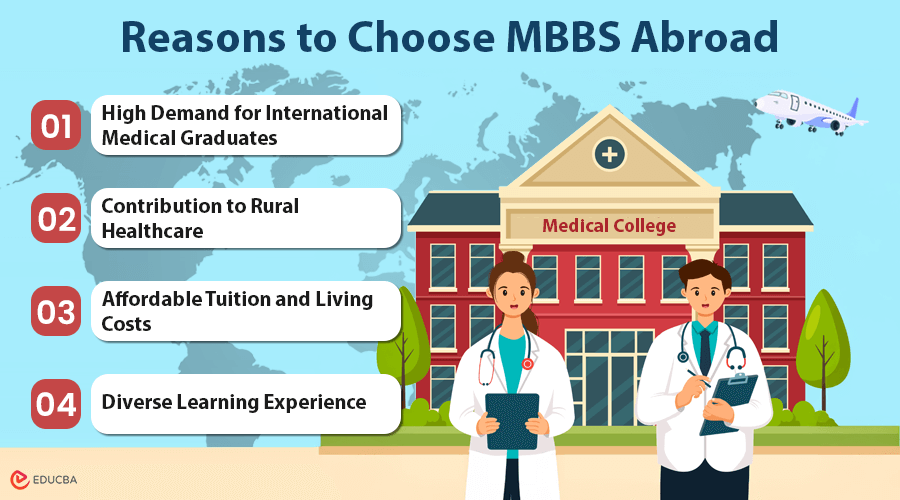
Why Study MBBS Abroad?
There has been a noticeable shift in how aspiring medical students approach their education in recent years. More students are choosing to study MBBS abroad due to the growing opportunities and advantages offered by international medical programs. With numerous universities across the globe providing accredited medical degrees, the appeal of MBBS abroad consultants is steadily rising. International medical education is now viewed as a viable and valuable option for students aspiring to become doctors. This article highlights why studying MBBS is becoming a preferred choice for many future doctors and why international medical education is receiving increased attention.
7 Reasons to Choose MBBS Abroad for Your Medical Career
Here are the top seven reasons why MBBS abroad programs are becoming so popular:
#1. High Demand for International Medical Graduates
International medical graduates (IMGs) are crucial in the US healthcare system. They currently account for 25% of the physician workforce in the United States, highlighting the growing importance of international medical education. Many IMGs fill critical gaps, especially in underserved and rural areas, and the demand for these graduates is rising.
#2. Contribution to Rural Healthcare
IMGs are important in improving healthcare access in underserved regions, mainly rural areas. During the COVID-19 pandemic, 45.6% of IMGs provided healthcare to rural patients, and 64% worked in underserved areas. This is particularly important considering that only 10% of doctors in the US work in rural areas, despite more than 46 million Americans residing there. The contribution of IMGs in such areas highlights the importance of global medical education in addressing healthcare challenges in remote communities.
#3. Affordable Tuition and Living Costs
One of the major advantages of studying abroad at MBBS is the affordability factor. Many countries offer MBBS programs at significantly lower tuition fees than private medical colleges in countries like India. In addition to lower tuition costs, living expenses in many countries are more affordable. For students seeking an affordable yet high-quality medical education, MBBS abroad programs present a cost-effective option without compromising on the standard of education.
#4. Diverse Learning Experience
Studying MBBS abroad exposes students to diverse healthcare systems, patient populations, and cultural backgrounds. This diverse learning environment equips students with the necessary skills to work in a wide range of global healthcare settings. It expands their understanding of patient care and improves their ability to adapt to various medical practices. Cultural diversity in medical education also enriches the learning experience, allowing students to develop a holistic approach to medicine.
#5. Advanced Infrastructure and Technology
International medical schools often offer state-of-the-art infrastructure and modern medical technology, greatly enhancing students’ learning experience. Many medical institutions abroad have cutting-edge facilities and equipment that allow students to receive practical, hands-on training with the latest tools in medical science. This exposure to advanced technology prepares students to meet the challenges of modern healthcare and ensures they are well-equipped for their future careers.
#6. Globally Recognized Medical Degrees
One key advantage of studying MBBS abroad is the recognition and accreditation of many international medical programs. Universities around the world offer MBBS degrees recognized by global medical boards, which allows students to practice medicine not only in the country where they studied but also in other parts of the world. For example, numerous universities in Europe, Asia, and other regions offer MBBS programs recognized by organizations like the World Health Organization (WHO) and the Medical Council of India (MCI). This global recognition ensures graduates can pursue medical careers internationally, providing them with many opportunities in different healthcare systems.
#7. Opportunities for Specialization and Research
International medical programs offer students various opportunities to specialize in cardiology, neurology, pediatrics, and more. These programs also provide valuable research opportunities, allowing students to engage in meaningful research addressing global health challenges. According to recent statistics, 38% of students planning to pursue a career in global health intend to participate in research focused on solving healthcare system issues worldwide. The Association of American Medical Colleges (AAMC) reported an 18% increase in medical school applicants compared to the previous year, highlighting the increasing global demand for healthcare education.
Final Thoughts
The growing popularity of international medical education and MBBS abroad programs reflects the changing landscape of global healthcare. By embracing the internationalization of medical education, we can strengthen the global physician workforce, improve health outcomes worldwide, and ensure that the next generation of physicians is prepared to meet the complex health needs of diverse populations and play a key role in advancing global health.
Recommended Articles
We hope this guide to pursuing an MBBS abroad helps you navigate your educational journey and make informed decisions. Check out these recommended articles for more insights into studying medicine overseas.


